How NYC Subway, LIRR, and Metro-North Responds to Snowstorms
Snow blowers, throwers, plows, and more specialized equipment help keep NYC moving in the snow!


Fall is officially in full swing. As we start to embrace its chilly breeze and indulge in treats, such as cider and everything Pumpkin related, there’s another aspect of the season that’s worth visiting – the striking, bedazzling colors of fall foliage.
While the beautiful array of colors may not be as noticeable in New York City, there are still plenty of places both in and nearby the City where New Yorkers can enjoy the splendors of autumn.
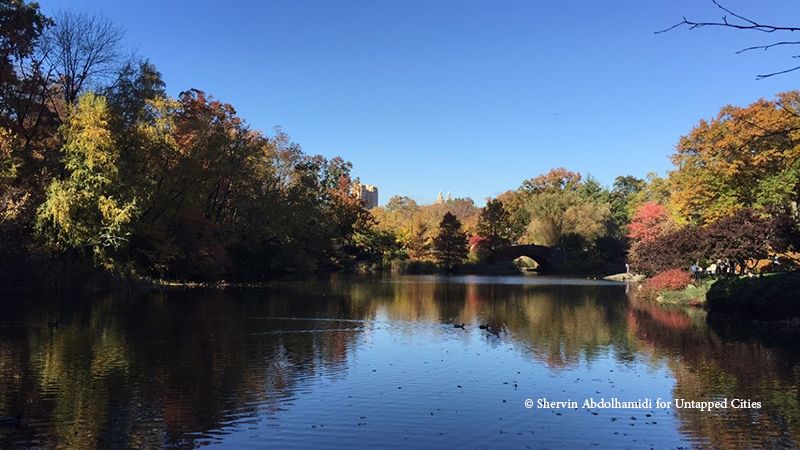
As the fifth largest park in New York City, and the largest park in Manhattan, Central Park has a plethora of spots to take in the fall foliage. Enter at the Fifth Avenue and 59th Street entrance and enjoy a stroll over the vintage Gapstow Bridge, with an assortment of fall colors in the background. Otherwise, start at the Conservatory Water, near Fifth Avenue and 72nd Street, and gaze at the hawthorn trees covered in red berries. Further towards the middle of the park is the 38-acre Ramble. In the southern section of the Ramble is the Tupelo meadows, comprised of a cluster of Tupelo trees with leaves that appear in various shades of red, yellow, and purple.
For an unobstructed, panoramic vantage point of the foliage, head over to Belvedere Castle. Built to provide park visitors with a great view of Central Park, Belvedere Castle’s observation deck provides an unparalleled vista of Turtle Pond and the Great Lawn.
You can also head to the secluded northern parts of Central Park where the various oak, elm, red maple, and black cherry trees will leave you feeling like you’re in upstate New York, without having to leave the confines of the City.
On Sunday, October 23, Central Park hosts a Fall Photography Scavenger Hunt–a fun family event that takes place in the northern end of the park at the Dana Discovery Center.
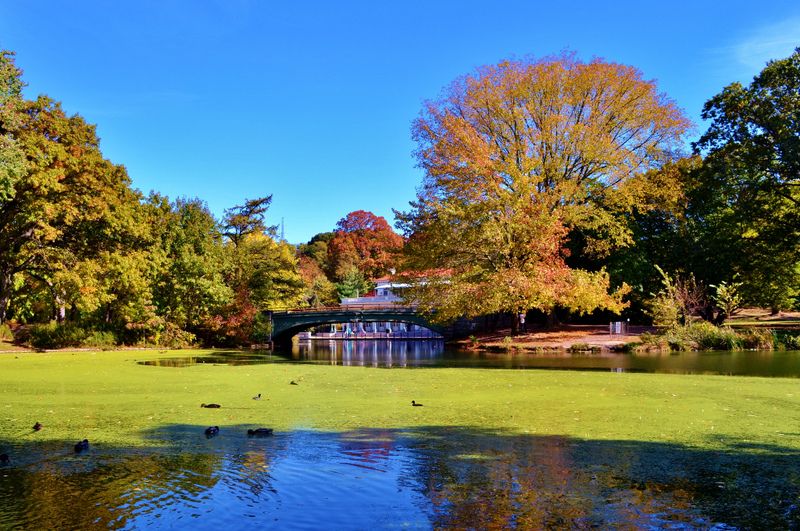
Photo by gigi_nyc from the Untapped Cities Google Glass Scavenger Hunt
From the walking trails encircling the park’s pond to the Ravine in the center of the park (which contains Brooklyn’s last remnants of old-growth forest) Prospect Park is an ideal location to check out the dazzling colors of fall in Brooklyn. The maple trees around the pond are typically the first to change color, turning shades of orange and red. Walking trails, such as the Lullwater and the Peninsula, boast picturesque views of the pond. The numerous hiking trails in Prospect Park provide an escape from the city and allows visitors to immerse themselves into nature.
On October 22, the park hosts a Fall Foliage Walk, called Trees of Prospect Park. Organized by Urban Park Rangers, this free educational and recreational tour takes visitors around the Ravine to see the foliage and diversity of trees in the area.
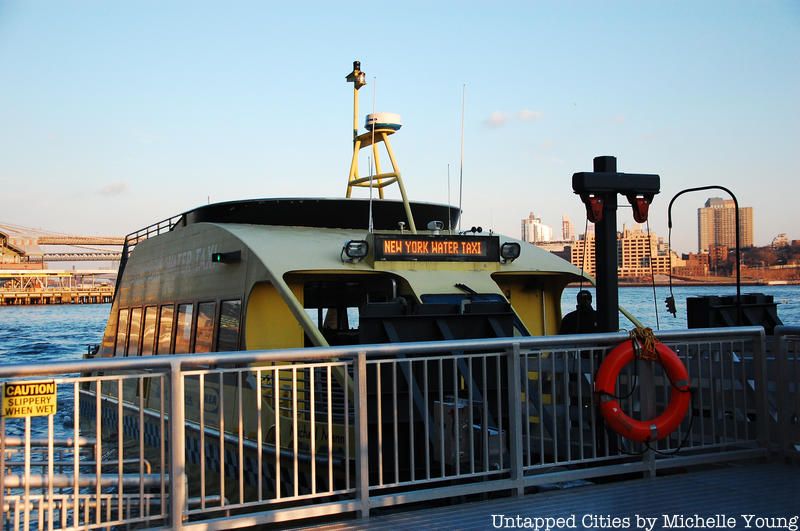
While New Yorkers are accustomed to seeing tourist-filled New York Water Taxis buzzing up and down the Hudson and East River, the boat tour company also offers Fall Foliage Cruises. Operating on four days in late-October and early-November, the day trip takes passengers on a peaceful and scenic ride up the Hudson River. The cruise lasts around 4.5 hours and includes lunch, wine tasting–and of course complimentary cider!

Situated on one of the highest elevations in Manhattan, the ridges of Fort Tryon Park have a commanding view of the Hudson River, the George Washington Bridge, and the cliffs of Palisades Interstate Park. In Autumn, visit the park for a stroll through the Heather Garden–the largest public garden with unrestricted access in New York City. The garden is home to over 500 varieties of perennials and shrubs that display dazzling colors in the Fall.
Afterwards, hike to Linden Terrace, one of the highest points in Manhattan, which provides visitors with a mesmerizing vantage point to see the Hudson River and the Cloister towers. Across the glittering waters is the Hudson River Palisades, 20 miles of cliffs shrouded in the striking colors of Fall foliage.

Each year, as the weather cools and the leaves turn shades of red and yellow, Amtrak offers its passengers an inimitable Fall experience. From September 25th to November 4th, Amtrak utilizes its 1955 Great Dome car to travel through the Adirondack Mountains. Used on the Adirondack line–one of the most scenic rail routes in the U.S–the double-Decker train car offers riveting views of Upstate New York’s lakes, mountains and rivers.
The Adirondack Line runs from New York City to Albany and Montreal, with stops in Saratoga Springs, Poughkeepsie, and Ticonderoga. The Great Dome car, which is added in Albany, can be accessed for no extra charge on a first-come-first-serve basis.
Another Amtrak Fall feature train is the Autumn Express. This one-day excursion runs on October 29 and 30th. The ride first heads west along the former Lehigh Valley Railroad, including a passage through the historic Musconetcong Tunnel, which opened in 1875. The train then crosses the Delaware River and traverses the scenic farm counties of Pennsylvania all the way to Harrisburg. Afterwards, the train heads south for a photo stop at the Amtrak station in Lancaster, PA, before heading back north across lovely Lancaster County countryside to New York City.
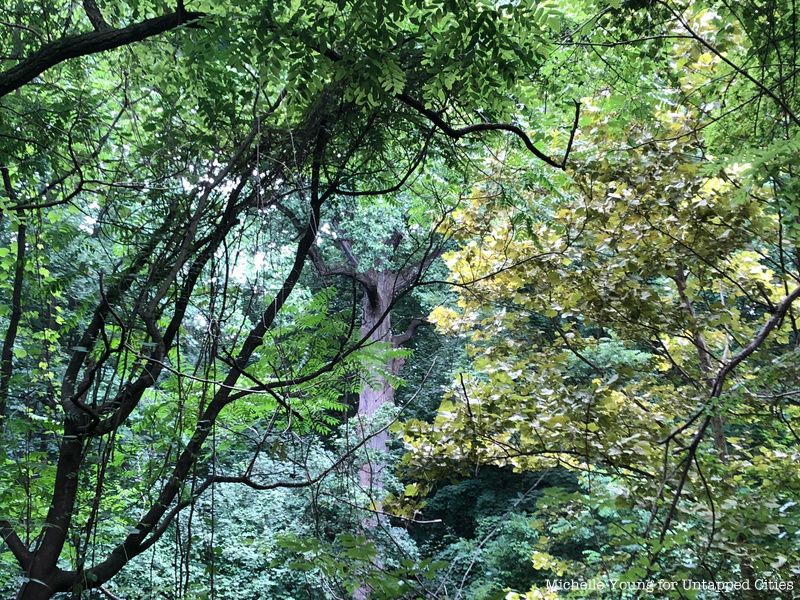
Located in the eastern extremities of Queens, Alley Pond Park is the second largest park in the borough. The park includes the typical varieties of trees that are natural to the area, such as white oak, red maple and sassafras. While Alley Pond Park is overshadowed by more distinguished names such as Forest Park and Flushing Meadows-Corona Park, this green space in Queens boasts an interesting title. The Park is believed to host the oldest living organism in New York City: a 250-feet-tall tree tulip called the Queens Giant, which is thought to be over 450 years old.
Aside from the Queens Giant, Alley Pond Park has numerous trails that are great for scenic fall strolls.

Everyday a multitude of cars drive on Palisades Interstate Parkway without realizing that to their side, along the ravines overlooking the Hudson River, a park has existed since the early 20th century. Located across the Hudson River starting from the George Washington Bridge, Palisades Interstate Park consists of 12 miles and 2,500 acres of cliffs, shore front, hiking trails and a biking road. Currently the park is accessible by bike or car via the George Washington Bridge, or by bus, which frequently departs from Port Authority. During the Fall, the meandering road that runs the length of the park is bordered by thick, colorful trees. With numerous scenic lookouts, the park is a great spot for picnicking, biking, paddling, hiking, or walking.
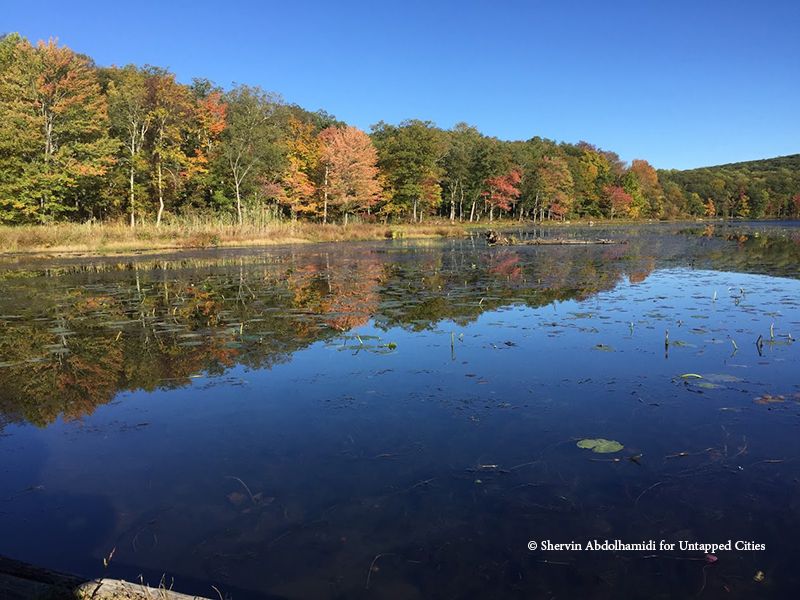
Only an hour north from the City, Harriman State Park, spanning 47,000+ acres, is the second largest park in New York State. Together along with Bear Mountain State Park, it offers countless hiking trails in varying difficulty levels, including 20 miles of the Appalachian Trail. Located only 60 miles away from NYC, this park is accessible via buses leaving from Port Authority. One of the best views there is at Perkins Memorial Observatory in Bear Mountain. Thanks to its locations, situated on the crest of a hill, the observatory affords a spectacular, panoramic vista of the Hudson River Valley, the Hudson River, and even some parts of New York City. The view is especially breathtaking in the Fall, when the leaves cast a colorful blanket over the lush hills.

As the third largest park in New York City, Van Cortlandt Park contains over 1,000 acres and an estimated 80,000 trees within its boundaries. This makes it a great spot for leaf peepers to see species such as oak, sweet gum, and hickory. For more scenic views, walk along the Old Croton Aqueduct Trail, once a 19th century engineering feat that supplied New Yorkers with a 100 million gallons of fresh water per day; it has since been converted into off-road biking and pedestrian paths.
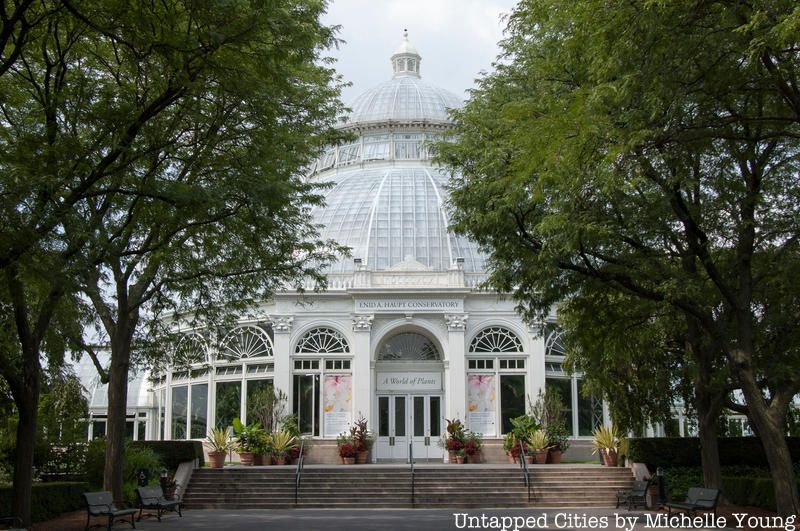 Opened in 1902, the Haupt has been restored several times, most recently by Beyer Blinder Belle Architects in 1997, and refurbished in 2010.
Opened in 1902, the Haupt has been restored several times, most recently by Beyer Blinder Belle Architects in 1997, and refurbished in 2010.
As dazzling and beautiful as the New York Botanical Garden is during the Cherry Blossom Festival in Spring, the garden’s Thain Family Forest affords some of the best leaf spotting in the City. The 250-acre woodland area is the oldest patch of old-growth forest in the city, with some trees dating back to the 19th century. The woodland is also comprised of a variety of species, such as red maple, oak, tulip trees, sweet gums, and scarlet oak.
During the first and second week of November the Garden hosts guided foliage tours of the Thain Family Forest where visitors can immerse themselves into the woodland and learn about the various species of trees.
Next, check out The Top 12 NYC Nature Trails For Fall (and Year Round) Exploration.
Subscribe to our newsletter